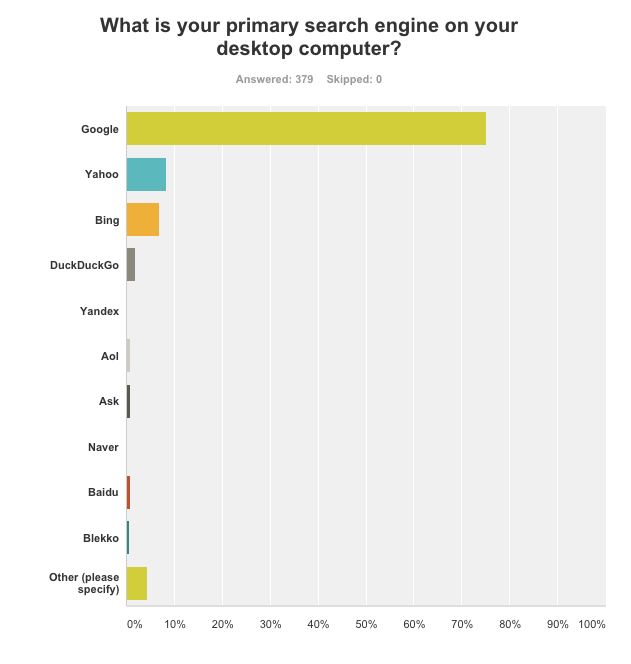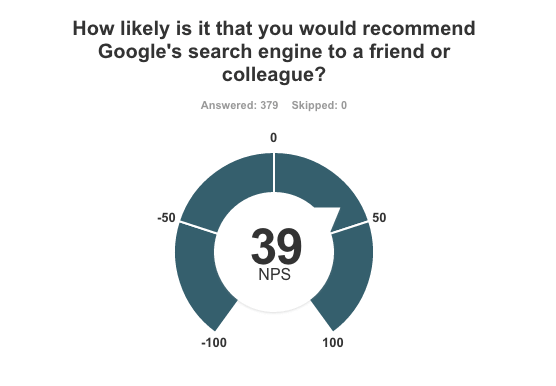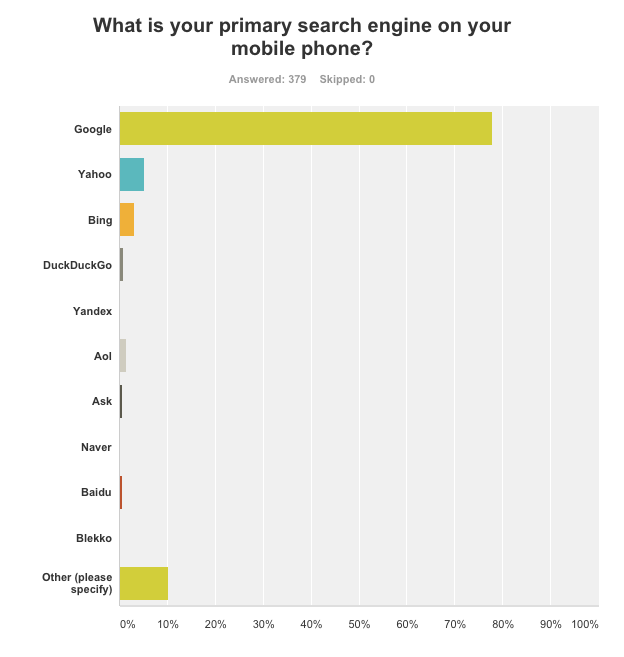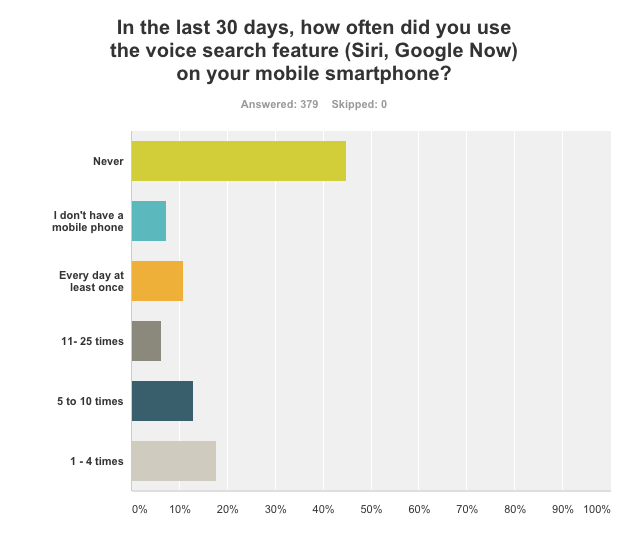Is Google’s Search Market Share Actually Dropping?
In a followup to his 2014 survey, contributor Eli Schwartz shares his data on search engine market share and looks at how it’s changing over time.
Last year, I conducted a comprehensive survey to discover the search engine preferences of internet users and learn who truly dominates the search market.
All of the current search engine market share reporting entities (comScore, Hitwise, SimilarWeb and others) utilize technology-based tracking, and I wanted to see if a survey panel-based approach would yield the same results.
What I discovered was only somewhat surprising. My results, placing Google at the top with 80 percent of the market, differed significantly from comScore’s 67 percent; but my findings were in line with most of the Google Analytics accounts I had seen, which show Google generating between 80 percent and 90 percent of all organic visits. Last year, I was at a loss to explain the discrepancy between my survey data and comScore’s data, but I chalked it up to how demographics might be weighted in comScore’s panel.
Nonetheless, even if comScore’s methods might be undercounting Google, they should accurately follow directional shifts.
In October 2014, comScore reported that Google had 67.3 percent of the market, Bing (called Microsoft Sites) had 19.4 percent, and Yahoo had 10 percent. In October 2015, comScore reported that Google dropped to 63.9 percent, Bing rose to 20.7 percent, and Yahoo jumped to 12.7 percent. While Google only dropped a few percentage points, Yahoo’s jump is a pretty substantial 20-percent increase in market share.
In the 2013 comScore report, Google’s market share was 66.9 percent; in 2012, it was 66.7 percent, and in 2011, it was 65.3 percent. At least according to comScore, 2015 marks Google’s market share at its lowest point in five years. (Incidentally, it is Yahoo’s best year in the same time frame.) If accurate, the change in market share could indicate that some big changes are afoot in regard to Google’s dominance of the search world.
Why Does This Even Matter?
As the internet moves closer to the holy grail of individualized marketing, building personas for marketing initiatives is no longer an ideal but a requirement. A big portion of a persona, especially for digital products, is how people use technology. Knowing whether your customers are likely to be found on Google, Bing or Yahoo should drive where you spend your SEO and PPC budgets.
Additionally, a world that has Google as the monopolistic player is very different from one where there are alternatives and a constant change in market share. In this world of alternatives, marketers can’t afford to just focus on one search engine, but instead need to take into account how things work for other search engines.
No one wants to get caught flat-footed when the market shifts and people no longer use search the way we have been accustomed to.
Methodology
Therefore, I determined that I had to run the same survey again to see if a user panel approach would show the same directional change as comScore and confirm that Google’s market share had slipped. Just like last year, I conducted the survey using my employer’s SurveyMonkey Audience tool.
As with any project run on Audience, the respondents are drawn at random from the millions of people who take a survey with SurveyMonkey every single day and are weighted by population for gender, age and geographic location. This methodology was used to successfully predict the results of the US elections in 2013 and 2014, and it is currently being used to poll for the 2015 election.
According to a simple sample size calculation, only about 300 respondents in the US would be needed in order to have the ideal sample. For my survey, I received 379 responses (from the US only); therefore, my results should accurately mirror reality.
Primary Search Engine
On the question of which search engine respondents considered to be their primary search engine, Google was the big winner, and here are the rankings of all the top search engines.
- Google — 75 percent
- Yahoo — 8 percent
- Bing — 7 percent
- DuckDuckGo — 2 percent
- Aol — 1 percent
- Ask — 1 percent
- Baidu — 1 percent
In last year’s survey, Google led with 80 percent, followed by Yahoo at 8 percent and Bing at 6 percent. Based on these results, Google did in fact decline, while Yahoo stayed the same and Bing increased. The difference was made up by the smaller search engines like DuckDuckGo, Naver and Baidu.
This year, I decided to ask some additional questions to learn more about how people felt about the search engines. There is a common metric used by many companies called the Net Promoter Score, where respondents are asked to rate a company or product on a scale of 1 to 10 on how likely they are to refer the company/product to a friend.
The results are then calculated to assign the company/product a score between -100 and 100, with positive scores indicating a positive sentiment and negative scores indicating a negative one. This metric was developed by Bain as a way to gather a quick gauge on customer sentiment.
I asked all respondents in my survey to rate the major search engines and calculated Net Promoter Scores for each. Google scored quite high with a score of 39, while Yahoo and Bing scored an abysmal -66. Unfortunately, I did not ask this question last year, so it is impossible to tell how things are changing, but I can include this question in future surveys.
Mobile
Reflecting on how important the mobile web has become this year, I added some questions on mobile search. When asked which search engines users use on their primary mobile device, Google was the clear winner, with an even higher percentage than their desktop share.
- Google — 78 percent
- Yahoo — 5 percent
- Bing — 3 percent
- DuckDuckGo — 1 percent
- Ask — 1 percent
- Aol — 1 percent
The differences in market share between desktop and mobile could be driven by the fact that people just click an app icon to search versus actually typing a search engine URL into a browser.
Some of the people who chose the “other” option as an answer declared that they just used “Safari” or “Sprint,” which means that they don’t really know how they are searching.
An additional mobile question I asked was how often people use the voice search assistants (e.g., Google Now, Siri and Cortana) on their phones.
- 47 percent never use it.
- Only 11 percent use it every day.
To me, this result was quite shocking, since these virtual assistants are promoted as a key feature by both Apple and Google, yet it seems that this feature is only being used by a select niche. (Note the airtime that Google Now and Siri received in their most recent respective product launches.)
Other Insights
Here are some other general insights that might be helpful for any marketers looking to better understand their customers.
Not surprisingly, which search engines people choose varies by demographics. When I looked at a comparison between males and females, a higher percentage of males (77 percent) primarily use Google on their desktops versus females (71 percent). On mobile, the percentages using Google were a lot closer: 78 percent female, 76 percent male.
The choice of search engine also seemed to be very dependent on age; 82 percent of users under 45 chose Google as their primary search engine, while only 66 percent of respondents over 45 did.
When building personas of your users, it is not enough to just bucket their behavior and shopping behaviors; you also need to take into account their technology usage patterns.
You already know that an iPhone user will need to experience your website or product differently from the way an Android user would, but you should be just as knowledgeable about changes you should make in your marketing based on how these customers use search engines to find you.
Pause whatever you are in middle of right now to at least set up your Bing Webmaster Tools, and start exploring adding your keywords to Bing Ads for PPC.
Only time will tell if the Google market share change on desktops will continue to trend downward, but you need to be prepared for a time when users decide to start using Yahoo and Bing more than they currently do.




